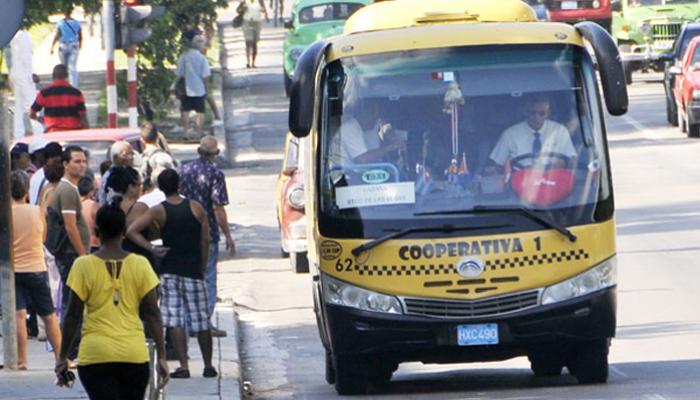Over 100 Thousand Cubans Hired by Self-Employed Businesses
Private business in Cuba have hired a total of 100 thousand 448 employees up to last September, which is in tune with the promotion of the new non-state employment modality.
Homero Acosta, secretary of the Council of State told reporters in Havana that the Cuban Council of Ministers approved 498 new cooperatives, 283 of them have been already set up particularly in the catering and service sectors.
Major private businesses are operating in the processing and expenditure of food, transportation and house rentals.
At the national level, a total of 473 475 Cubans have joined non-state jobs and they may apply for the social security system in tune with the Cuban Social Security Law of 2008, Acosta said.
This is a benefit which is rare in other countries where independent workers in the so-called informal sector have no access at the protection offered by the state. And this way, the protection of this kind of labor gains importance in order to favor fair relations between employers and employees.
Cuba Audits New Cooperatives
A national audit to take place from October 20th to November 28th will target the performance of the new cooperatives set up in non-agriculture areas, with the objective of controlling and helping their appropriate development.
During a press conference in Havana, General Comptroller Gladys Bejerano said that the audit will contribute to improve the emerging economic entities so that they are set up correctly and that the process has preventive and educative nature aiming not only at detecting problems but also their causes.
A total of 386 entities will be targeted by the audit, including 46 cooperatives, which were recently set up.
As to the agricultural area, deputy comptroller general Alina Vicente said that also on the spotlight will be the commercialization of produce in western provinces of Havana, Artemisa and Mayabeque, and also a group of important recycling companies, the sales of construction materials to the population and the granting of land in usufruct.
Auditors include over 3 thousand persons, with some 580 university students well trained for the process, who will also focus on accounting activities in the different entities.
Cuba Develops Artificial Intelligence Apps
Researchers presented in this city artificial intelligence applications developed in Cuba and used in different branches of the economy, at the opening of the 12th National Congress of Pattern Recognition, eastern Las Tunas.
This branch of computer science consists in the development of computing tools and algorithms for the diagnosis, classification and prognosis of images, videos, texts and other media, allowing its use in areas of health, services and national security.
Surveillance systems, databases, disease diagnosis and biometrics programs by analyzing voice, iris or fingerprints, are some software which are being applied in the country, Edel García Reyes, president of the Cuban Society for Pattern Recognition and Data Mining, told ACN.
He added that this institution has promoted the exchange of information between national and foreign experts which has enabled the implementation currently of projects in different research centers across the country and the production of highly competitive applications.
The development of these programs in Cuba has been conditioned by the economic, commercial and financial blockade of the United States, which prevents access to such products, Jose Ruiz Shulcloper, director of the National Center for Advanced Technologies Application (CENATAV by its Spanish acronym), said.
The academic noted that the Caribbean nation also ensures its technological independence and opens an economic line that saves resources by the levels of automation that generates and the possibility of exporting these software to other countries. The Cuban Society for Pattern Recognition and Data Mining was founded in 1998.
Experts Study Cooperation Agreements on Renewable Energy
Latin American experts participating in the International Renewable Energy Workshop, based in this city, will evaluate possible cooperation agreements for the development of this industrial section in the region.
The second day of the event, which met at the Havana Conventions Palace attended by hundreds of delegates, also hosted the presentation of several projects implemented on the Isle of Youth, where it already operates a modern biomass gasification plant.
Some specialists expressed in their speeches for a field study in much of the country to help to reveal appropriate places to install infrastructure for obtaining such energies.
The fuel gas obtained from biomass gasification can be exploited in various ways: in the production of electricity and/or thermal energy at a lower cost than that generated by traditional industries and without affecting the environment.
It is a difficult path despite the benefits, experts say, because generating renewable energy for commercial purposes provokes the large multinational companies to prevent the entry of the product into the world market to avoid its low cost to undermine the high prices of other resources.
However, they agree that it is ideal for developing countries, as the industries that opt for the renewable model assume a double benefit as they generate energy from biomass and work simultaneously with the obtained fuel.
Biomass gasification is a thermochemical process in which this natural resource, usually of woody origin, is transformed into a combustible gas, which increases value to energy generation.
Spain’s Melia Hotels Expands Operations in Cuba
Spain’s hotel chain Melia International will open a new hotel on the Jardines del Rey keys to operate during the upcoming winter season.
Marketing specialist with the Ministry of Tourism in central Ciego de Avila province, Luis Baez, told local Prensa Latina news agency that the Melia Jardines del Rey hotel will be located at Flamenco Beach, on Cayo Coco Key, off the northern coast of the central province.
The 5-star facility counts on 1176 hotel rooms, including 3-story bungalows, which makes it the largest facility managed by Melia on the island. Melia Hotels International has 400 hotels in 40 countries, 27 of which are in Cuba.


